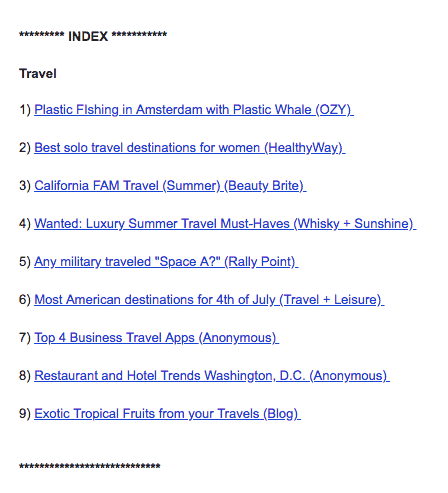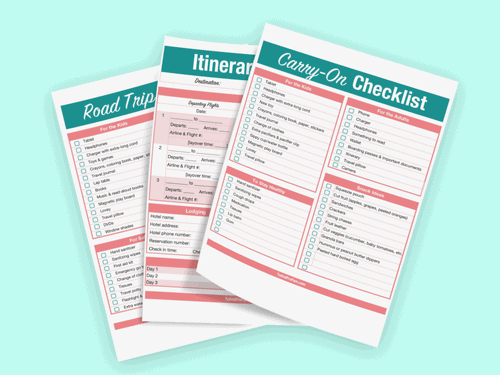When you write a blog, you want your site to have credibility—after all, Google takes that into account when ranking search results. The more reputable your blog, the more likely you are to land on the first page of a Google search. And that, friends, is how you gain readers through SEO. Domain authority (DA) is the way search engines measure how reputable your blog is—like if your blog has street cred. But how to increase your domain authority?
I started this family travel blog in spring 2018, and just like every brand-new blog, my DA was in the dumps. (New sites automatically start at a domain authority of 0.) Over time and as you write more blog posts, your domain authority will gradually rise—but without intentionally trying to raise your domain authority, your growth will be slow.
So I went about figuring out how to increase your domain authority faster. And I found these effective, free, low-effort hacks to increase your domain authority.
Now the most important thing you can control that will increase your domain authority is to produce really good content. That means regularly writing new posts that help your readers and being consistent in your posting schedule. I’m writing this post from the assumption that you’re already blogging regularly and are working to make those posts thorough, well written and informative.
In this blog post, I’ll share exactly how I built online credibility and increased my DA from 3 to 21 in less than 6 months. And I share each strategy here so you can raise your domain authority, too!

How to increase your domain authority steadily and efficiently
So you’re wondering how to increase your domain authority—welcome to the club! Before we dive into my strategies to increase your domain authority steadily, we need to cover some basics.

First, what the heck is domain authority?
Domain authority is the internet’s way of measuring how often your blog is referred to, or name-checked, via links. If it feels icky like a high school popularity race, that’s because it is… kind of.
But with all else that Google and other search engines do, it’s in the interest of the customer—the person who is searching for the information they need.
Domain authority is a measurement between 0 – 100, and it takes into account many factors, including how many inbound links your blog has. The more sites and pages that link to your blog, the more credibility your blog has, and the higher your domain authority will be. The higher your domain authority, the more likely search engines are to refer readers to your blog.
But not all links are created equal. A linkback from a site with a high DA counts more than a site with a low DA. And a linkback from a page or site that’s in your niche is more valuable than one from an unrelated topic.
Extremely well respected sites—think Wikipedia or the Washington Post—will have extremely high DAs. Your blog will surely have a lower domain authority—but that’s not necessarily a deal-breaker!
After all, you just want to have a high domain authority in relation to other similar blogs. So since this is a family travel blog, I want to increase my domain authority in comparison with similar blogs if I want to outrank them in search results.
Generally, it’s easier to increase your domain authority the lower it is. So it’s easier to go from a 5 to a 10 than from a 45 to a 50.

What is my domain authority?
To start with, you want to check your domain authority. You can google “check your domain authority” and a bunch of free sites will pop up.
I use this domain authority checker.
Write down your domain authority so you can track how it changes depending on what DA hacks you use, how many posts you publish, and how long your site has been live.
I set a reminder in my calendar to check my domain authority and other statistics on the last day of every month. That way I can track improvements in my blog’s presence online.
Strategy 1 to raise your DA: Be an expert
Now that you understand the fundamentals of DA, let’s work on how to raise your domain authority.
The folks who designed DA intentionally made it difficult to directly affect it. After all, you can’t increase your popularity by talking about how cool you are; your popularity depends on what other people think of you.
Same with DA. You need to increase the number—and quality—of linkbacks to your blog to increase your domain authority.
The absolute best strategy I’ve found in getting high-quality linkbacks to my blog has been HARO.
What is HARO, and how does it help increase your domain authority?
Help A Reporter Out (HARO) is a platform for journalists, bloggers and sources to get information from experts. That can be bona fide experts (like a biomedical researcher) or simply people who have a first-person story to share.
To use HARO, you sign up as either a reporter or a source (or both). For the purposes of increasing your domain authority, we’ll talk about using HARO as a source.
You then click the boxes you have an expertise in. This blog is focused on family travel, so I just clicked travel. Then, three times a weekday, you’ll receive an email with “queries”—requests for information or help from people writing about a topic where you’re an expert. The emails will look something like this:

Many of these queries aren’t right for me as an expert on family travel, but sometimes they’re spot on. The trick is to find the ones you’re uniquely qualified to answer—that way your response is more likely to get picked up, and you won’t waste time on responding to queries that relate to your niche only peripherally.
You answer a reporter’s question using the email form, which goes through HARO so you don’t actually correspond directly with the writer. The reporter may or may not use your information, but if they do, they’ll link back to your blog. You can see which of your responses has been accepted on your HARO dashboard. And—bingo!—you just got a high-quality linkback. You’re on your way to increase your domain authority!
Strategy 2 to raise your DA: Collaborate with other bloggers
No matter how often you check and respond to queries on HARO, though, you shouldn’t stop there. After all, if you’re reading this post on how to increase your domain authority, you’re dedicated to growing your DA steadily—so you don’t want to sit back with just one strategy.
That’s where my second domain authority hack comes in: collaborating with other bloggers.
Who should I collaborate with?
There are several factors you want to consider when looking for bloggers to collaborate with.
- You want to collaborate with bloggers in your niche who have a similar target audience. That way, when these people who have never come across your blog read your brilliant insights, they’ll click over—and start following you, too.
- You want to collaborate with bloggers who publish high quality content. Take a look at their previous posts—are they thorough, helpful, well written? You want to associate your blog with other strong blogs.
- You want to collaborate with bloggers who have a strong DA. (Look up their domain authority with a DA checker.) Remember how linkbacks from sites with high DAs count more? This criteria will help grow your domain authority faster.
That said, don’t discount working with bloggers with low DAs, especially at the beginning. When you’re just starting out, links from most places will help—and they definitely won’t hurt!
Where do you find bloggers to collaborate with?
Fellow bloggers frequently ask me where to find like-minded people to collaborate with. Here’s where you can find them:
- Facebook groups. Join blogging groups on Facebook that have a collaboration component. There are a zillion blogging groups and it can be hard to find ones that work for you—much of this is by word of mouth recommendations or trial and error. My best practice advice is to find a blogging group directly related to your niche—that way you weed out a lot of collaboration requests that simply don’t make sense for your blog.
For my family travel blog, the Female Travel Bloggers Facebook group run by Female Travel Bloggers has been the best source of collaboration opportunities. (You have to request to join it.)There is a collab post each month where members post collaboration opportunities that I often respond to. - Pinterest. Join group boards to find other bloggers writing about similar topics. Reach out to them with a collaboration idea. Maybe you can write two posts together by each contributing tips—then cross-promote the posts on your social media.
- Your blogging circles. Blogging is a super friendly community, and you surely have other blogger friends. Start a group thread to brainstorm a post topic where you can all contribute a few tips, recommendations or ideas—then write it together, linking to each other.
How to use collaboration to boost your DA—without investing hours + hours
Some threads you see on these Facebook groups are requesting guest posts—that’s not what I’m talking about here with collaborating with other bloggers. (More on that below.) So what exactly do I mean by collaborating with bloggers?
The most efficient way to gain strong linkbacks and increase your domain authority is to contribute a small amount of original content to a post that collects a bunch of tips, recommendations or ideas from a group of bloggers.
Take, for example, the post 13 Midwest Hot Spots by Katherine at Bright Lights of America. She did a round-up of the best destinations in this often overlooked area of the US. But she didn’t write all the content; instead, she got recommendations from a bunch of bloggers (including me).
This kind of post, which includes usually 100-200 words from a number of bloggers, is a great way to collaborate and increase backlinks. For Katherine’s post, I spent probably 5 minutes writing about Detroit murals in Eastern Market and formatting a photo she could use. In return, I got a quality backlink and introduced my blog to her readers and followers. I, of course, also promoted the story on all of my social media channels, so it’s a win for everyone!
By regularly collaborating with bloggers, you’ll increase backlinks—and increase your domain authority.

Strategy 3 to raise your DA: Guest Post
I left this domain authority hack for last because it’s the most controversial of the three. Guest posting is when you write an original post (or rewrite/repurpose old content) along with images for someone else’s blog. The guest post contains one or more links back to your blog and social media accounts.
Why is guest posting controversial? Let’s look at the pros and cons, especially related to how to increase your domain authority.
The pros of guest posting
- Expand your reach. When you write a guest post, you reach new readers. If you guest post on a related blog, chances are their readers are interested in what you have to share, too. If they like your guest post, they may click over to follow you, too.
- Leverage social media networks. When you write a guest post, the host blogger will promote the content on their social media—bringing you to an even deeper pool of potential fans.
- Build clickable backlinks. Most guest posts will allow for multiple links back to your blog, providing even more quality backlinks to your blog. In addition, if a reader commits to reading your whole guest post, they may be more likely to click to your blog, which tells search engines you’re super-relevant. That will help increase your domain authority.
- Reuse content. Guest posts need to be original (after all, search engines may penalize your site if the text shows up verbatim elsewhere). But you can still talk about the topics you’ve written about on your blog. Consider covering a familiar topic specific to the host blog’s audience, cobbling together tips from several posts, or getting either broader or deeper on a topic you’ve already written about.
The cons of guest posting
- It’s time-intensive. Guest posting takes quite a bit of time. Consider how long it takes you to write an original post, and if the benefits are worth that time.
- It takes up your content. Would the topic of your guest post be better suited to your own blog? Why put your best content on someone else’s site?
- You don’t have control. When I write or accept guest posts, I always make sure I’m clear about how much either person has the ability to edit/change things. But when your words are on someone else’s site, truth is you don’t have power over those words anymore.
When should you guest post?
I rarely guest post—I find my time is usually best spent developing my own blog and content, and that collaborating with other bloggers by writing short tips gets me the most bang for my buck (aka time and effort). That said, it’s sometimes worthwhile to guest post to increase your domain authority.
Here’s when I would consider guest posting:
- The blog has a high DA. If the host blog’s domain authority is high, the quality of the backlinks may be worth the time and effort you’ll spend.
- The blog has a big, engaged audience. You may gain new readers and expand your audience by guest posting.
- The guest post ask is easy. Maybe you can write about a topic in your sleep, or there’s a template a host blog asks you to follow. If it doesn’t ask that much of you, go ahead and guest post.
Recapping strategies to increase your domain authority
In this post, we’ve covered how to increase your domain authority with three straightforward strategies. You also learned what domain authority actually is and how to influence your DA.
From becoming an expert source to collaborating with bloggers and guest posting, you’ve learned solid strategies to increase quality backlinks to your blog. I think you’ll agree these strategies are doable, even with your busy blogging schedule.
Increasing your domain authority is well worth the effort. After all, with quality backlinks to your blog, search engines will consider your blog a better resource for searchers. And that, my blogging friends, will help more people reach your blog—and read the amazing resources you create!
Do you have questions? Please, comment below!







I’ve never thought about DA and still rarely do, but I hear fellow travel bloggers talking about it more than other food or lifestyle bloggers. Mine was 45 the last I checked it for a brand, and I don’t know what else to do with that number LOL. Your tips sound great! I’m going to actually try to do some SEO next year and will add some of these tips to my To Do list! Thanks Catherine!
You’re so welcome, Marlynn! The number per se doesn’t really matter; it’s more about what it signifies. Bottom line is backlinks tell search engines you’re well respected, which definitely helps your search engine traffic. Let me know if you want to talk through any of these strategies—I’m always happy to help!
I had never even looked into DA, I looked mine up with your link and I was pleasantly surprised! Thanks for sharing, I’m going to pin this and look into the strategies.
Glad it helped! I’ve only started to hear bloggers talk about DA in the last year or so. It’s only recently been on my radar, too.
Love this, I’m always looking for ways to boost my domain authority ever since I found out about it, so will be checking your tips
I’m so glad you found my domain authority tips helpful, Mimi. I hope they work for you too!
This is such an helpful post especially for those who are looking for increasing their SEO
Thanks, Paula! I sure hope it’s helpful. Blogging can be confusing, which is why I want to share what I learn!
This is such a helpful post – I’m super impressed you increased your DA that quickly! I’m excited to keep working on this, especially as all of these tips still focus on producing quality content. Thanks for sharing Catherine!
You’re very welcome, Hawnuh! There’s no getting around the need for quality posts – you can’t trick google, domain authority rankings or anything else committed to ensuring readers find the right web sites.
I’m saving this post so that I can reread it and apply the strategies you give! These are great tips! Thank you so much!
You’re so welcome, Andrea! Thanks for reading and I’m glad the domain authority hacks were helpful!
It seems like collaboration is key. Whether you’re collaborating with other bloggers by doing guest posts, or collaborating for reporter by using help a reporter out, it seems like Google really looks for that authority.
That is SUCH a good point, Vicky! Collaboration really is the thread that runs through all these strategies to raise your domain authority.
This is such good info to know! I’ve always wondered about this and you were able to help answer a lot of my questions just in this post.
Thanks for sharing a wonderful blog . may be you like this blog also https://www.vocso.com/blog/boost-your-domain-authority-fast-tips-from-21-digital-marketers/
That’s a pretty informative article on Domain Authority. Please share an article on to increase Trust Flow and Citation Flow of a domain.
I’m so happy you found it helpful, Klein!
Following your blog has increased my blog’s DA, thanks for writing such blogs.
You’re very welcome – so glad to help!!
thanks for sharing this informative blog
Nice Post. In order to increase your website domain authority(DA), your website should have quality do-follow backlinks so that they can pass authority or link juice.
All the information is very helpful which can help us to increase our knowledge. Another big interesting article, this blog is very useful for the website developer and learner.
I also get much knowledge from this blog.
thank you keep sharing.
You’re welcome, and glad my article on increasing your domain authority helped!
Another very helpful article! I registered for HARO, which I had never heard about! Thank you for this very helpful information!
You’re so welcome! A lot of people don’t know about these steps to increase your DA. It happens gradually but totally can be done!